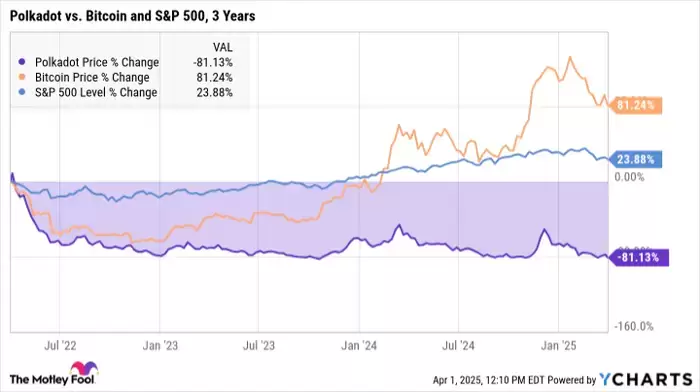 |
|
 |
|
 |
|
 |
|
 |
|
 |
|
 |
|
 |
|
 |
|
 |
|
 |
|
 |
|
 |
|
 |
|
 |
|
Cryptocurrency News Articles
Bitcoin vs banks: a silent yet brutal metamorphosis is underway
Apr 02, 2025 at 11:05 pm
Bitcoin, born in the shadow of the 2008 crisis, today embodies a revolution that shakes the foundations of banks.

In the hushed corridors of finance, a brutal metamorphosis is unfolding. Bitcoin, forged in the shadow of the 2008 crisis, today embodies a revolution that threatens to topple the giants of banking.
From promises of financial emancipation to technical challenges, its ascent raises a crucial question: can it truly dethrone the behemoths of traditional finance?
Let’s dispense with the usual clichés and take a candid look at the clash between these two paradigms.
Bitcoin vs banks: a war of architectures
Bitcoin is based on a peer-to-peer network, without a conductor. It’s a decentralized ledger, secured by miners who aggregate transactions in blocks, forming a chain of trust.
Banks, on the other hand, function like centralized cathedrals, where each stone depends on a higher authority. They are institutions supervised by the State, collecting deposits to grant loans.
This structural divergence explains why Bitcoin appeals to those disillusioned by institutions. It replaces trust in fallible men with irrefutable mathematics.
In 2021, El Salvador adopted Bitcoin as legal tender, despite warnings from the IMF and World Bank. The result? An economy less dependent on the dollar, but exposed to the cryptocurrency’s volatility.
Meanwhile, traditional banks, protected by State safety nets, have withstood the storms and emerged stronger. Bitcoin offers risky freedom; banks, corseted stability.
Bitcoin handles 7 transactions per second, compared to thousands for Visa or tens of thousands for Starlink. Solutions like Lightning Network are trying to bridge this gap, but the road remains long.
Banks, despite their touted heaviness, have already mastered the art of massive flows. An advantage that could erode if blockchain technology matures and new use cases emerge.
Bitcoin promises a bank account on a smartphone. Yet, 3 billion people still lack internet access, and in sub-Saharan Africa, only 48% of adults own a mobile phone. Without this digital infrastructure, the dream of inclusion remains a mirage.
Cross-border transfers via Bitcoin cost a few cents, compared to an average of 6% for traditional services. But this saving masks a problem: the volatility of BTC can eliminate gains in just a few hours. Stablecoins like USDC attempt to address this, but their peg to traditional currencies perpetuates dependency on the current system.
Security: blockchain vs human psychology
The Bitcoin blockchain has never been hacked. Its code, open-source and scrutinized by thousands of developers, is a marvel of resilience. But digital wallets, used to store private keys, on the other hand, are vulnerable.
In the first quarter of 2025, losses related to cryptocurrency platform hacks reached $1.63 billion. A staggering sum that showcases the urgency of cybersecurity in this rapidly evolving industry.
Banks, like Zoom in 2020, spend billions on cybersecurity, yet they still experience regular data breaches and fraud. In 2022, 74% of financial institutions reported an increase in cyberattacks.
Bitcoin eliminates intermediaries, but not human errors. It shifts the burden of vigilance onto the individual.
An advantage of banks is that they offer, at least psychologically, a greater sense of recovery. 20% of bitcoins are locked in inaccessible wallets. A simple USB key misplaced or lost, and fortunes evaporate.
Banks, with their administrative procedures and backup systems, forge a more durable fabric of security, even if it’s an illusion. They offer a psychological resilience that Bitcoin cannot yet provide.
Economic stability: the deflationary trap
Bitcoin is limited to 21 million units. A scarcity that attracts investors but poses a problem: how to manage an economy without any possibility of monetary adjustment?
Central banks use inflation or deflation as a lever to steer an economy out of crisis. Bitcoin, on the other hand, imposes a rigidity that may be an advantage in good times, but an unmanageable constraint in bad times.
In 2024, 60% of BTC holders consider it as “digital gold,” a hedge against inflation. Few use it to buy a coffee or pay their rent daily.
As long as it remains a speculative asset, its role as a currency for everyday exchanges will remain marginal. But banks, despite their flaws, retain the monopoly on these small, daily transactions.
BlackRock and JPMorgan are integrating Bitcoin into their funds, but as an investment product, not as a currency for small, daily transactions. A hybrid adoption that reinforces the current system more than it dismantles it.
The EU adopted MiCA in 2023 to regulate cryptos, and the United States oscillates between the stifling hand of the SEC and the rapid innovation of Web3 startups.
Without a clear framework for integration, Bitcoin will never supplant banks. But excessive regulation could jeopardize the decentralized essence of BTC and ultimately backfire.
Bitcoin will not kill banks. It forces them to adapt in an era of hybrid finance, where
Disclaimer:info@kdj.com
The information provided is not trading advice. kdj.com does not assume any responsibility for any investments made based on the information provided in this article. Cryptocurrencies are highly volatile and it is highly recommended that you invest with caution after thorough research!
If you believe that the content used on this website infringes your copyright, please contact us immediately (info@kdj.com) and we will delete it promptly.




























































